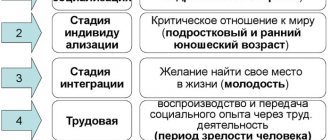One of the most interesting and mysterious areas of our psyche is the world of emotions. Studied for thousands of years by scientists from various fields of knowledge, it still keeps many of its secrets and mysteries. Emotions permeate our entire life, making it bright, rich, sometimes tremulous and tender, sometimes filled with unbearable burning pain. Yes, they are this life itself, because where feelings disappear, human existence ends.
It is psychology that most fully reveals the essence of this area of the human psyche - the only science that has managed to organically link together the physiological basis and manifestations of emotional states.
Types of emotions and their general characteristics
There are different types of emotions. Emotions and feelings vary depending on their quality
(positive and negative),
depth, intensity and duration of influence on activities.
The qualitative uniqueness of emotions and feelings expresses how a person relates to the corresponding phenomenon. Depending on how significant and how reality is reflected in emotions and feelings, deep
and
shallow
emotions and feelings.
Depending on the influence on activity, emotions and feelings are divided into sthenic
(from the gr. sthenos - strength) and
asthenic
. Stenic feelings encourage active activity and mobilize a person’s strength. Thus, feelings of joy or inspiration stimulate a person to energetic activity. Asthenic emotions relax a person and paralyze his strength.
By content originality
emotions distinguish the following types of emotions (Fig. 2).
Emotional tone of sensation
– our attitude to the quality of sensation, a mental reflection of the need properties of an object. Various sensations (smells, colors, sounds, etc.) are pleasant, neutral or unpleasant for a person.
| Mood |
| A long-term emotional state that does not reach significant intensity and does not have significant fluctuations over a long period |
| Extremely expressed but short-lived emotion |
| A fairly long-lasting and intense emotion that has a certain significance for a person |
| Emotional reaction to danger |
| Mental state of general excitement, tension during activities in difficult, unusual, extreme conditions; nonspecific reaction of the body to sharply changing environmental conditions |
| Features of experiences and behavior as a result of difficulties encountered on the way to achieving a goal |
| Emotional response |
| This is an emotional immediate reaction to current changes in the subject environment. |
| Emotional tone |
| Attitude to the quality of sensation, mental reflection of the need properties of an object |
| Affect |
| Fear |
| Passion |
| Frustration |
| Stress |
| Types of emotions |
Rice. 2. Types of emotions
We like the smell of flowers, the sound of the sea surf, the color of the sky at sunset, but the smell of rot and the grinding of brakes are unpleasant. There is even a painful organic aversion to certain stimuli - idiosyncrasy (for example, to the sounds made by a metal object grinding on glass).
The emotional attitude towards vital influences is inherited. This allows the body to react to it already at the first meeting with a harmful object. The emotional tone of various influences, fixed in memory, is then included in various perceptions and ideas. Emotional memory and a person’s emotional experience play a significant role in cases where it is necessary to act in conditions of a deficit of conceptual information.
Emotional response
– this is an emotional operational reaction to current changes in the subject environment.
An emotional response is determined by a person’s emotional excitability, his emotional tone; one of the types of emotional response is syntony
- empathy for the emotional state of other people - the most important social quality of a person. The ability for emotional consonance depends on the conditions of upbringing. People brought up in conditions of insufficient emotional contact or satiety with emotional contacts become incapable of emotional empathy.
Mood
is a general emotional state that colors a person’s behavior over a significant period of time.
Mood depends on the general state of health, the functioning of the endocrine glands, and the vital tone of the body. It is an emotional reaction not to the immediate consequences of certain events, but to their significance in a person’s life in the context of his life plans, interests and expectations. Mood, like all other emotional states, can be positive and negative, have a certain intensity, severity, tension and stability.
Affect
(
from the Latin affectus - emotional excitement, passion) is an excessive neuropsychic overexcitation that suddenly arises in an acute conflict situation, manifested in temporary disorganization of consciousness (its narrowing) and extreme activation of impulsive reactions.
Affect is an emotional explosion in an acute conflict situation, the danger of personal defeat. Deep resentment from a grave insult to a person, the sudden emergence of danger, gross physical violence - all these circumstances, depending on the individual characteristics of the person, can cause affect.
The state of affect is characterized by a significant disruption of the conscious regulation of human actions. A person’s behavior when affected is regulated not by a premeditated goal, but by a feeling that completely captures the personality and causes impulsive, subconscious actions. In a state of passion, the most important mechanism of activity is disrupted - selectivity in the choice of a behavioral act, a person’s behavior changes sharply, his attitudes and life positions are deformed, the ability to establish relationships between phenomena is disrupted, one, often distorted, idea begins to dominate in consciousness. From a neurophysiological point of view, this “narrowing of consciousness” during affect is associated with a disruption of the normal interaction of excitation and inhibition. The state of affect is associated with disturbances in the clarity of consciousness, which can lead to the inability to subsequently remember episodes of the event that caused the affect, and in the case of exceptionally strong affect, it can result in loss of consciousness and complete amnesia.
Affects associated with negative emotions (anger, hatred, jealousy) often acquire a destructive, aggressive nature, since a person acts reflexively, the latent period from the perception of the stimulus to the response is reduced to a minimum (several milliseconds), so the subject does not have time to realize the meaning and the consequences of their actions.
Passion
- this is a strong, persistent, all-encompassing feeling that dominates other impulses and leads to the concentration of all aspirations and forces on the subject of passion.
In terms of the intensity of emotional arousal, passion approaches passion, and in terms of duration and stability it resembles mood. The main sign of passion is its effectiveness, the fusion of volitional and emotional moments. Passion, having great power, is one of the essential motivations for activity. The unity of the moral, rational principle and passion is often the driving force behind great deeds, exploits, and discoveries.
Fear
- an unconditional reflexive, emotional reaction to danger, manifested in a sharp change in the vital activity of the body.
Fear arose as a biological defense mechanism. In most cases, fear causes a strong sympathetic discharge: screaming, running, grimacing. A characteristic symptom of fear is trembling of the body muscles, dry mouth (hence the hoarseness and muffled voice), a sharp increase in heart rate, increased blood sugar, etc. In this case, the hypothalamus begins to secrete neurosecretion, which stimulates the pituitary gland to release adrenocorticotropic hormone.
Socially determined causes of fear are the threat of public censure, loss of labor results, humiliation, etc. – cause the same physiological symptoms as biological sources of fear.
The highest degree of fear, turning into affect, is horror.
Terror is accompanied by a sharp disorganization of consciousness (insane fear), numbness (it is assumed that it is caused by an excessively large amount of adrenaline) or erratic muscle overexcitation (“motor storm”).
In a state of horror, a person may exaggerate the danger of an attack; his defense may be excessive, incommensurate with the real danger. The emotion of fear caused by dangerous violence encourages unconditional reflexive response actions based on the instinct of self-preservation.
Fear is a passive defensive reaction to danger, often emanating from a stronger person. If the threat of danger comes from a weaker person, then the reaction may acquire an aggressive, offensive character - anger.
In a state of anger, a person is predisposed to instant, often impulsive action. Excessively increased muscle excitation with insufficient self-control easily turns into very strong action. Anger is accompanied by threatening facial expressions and an attack pose. In a state of anger, a person loses objectivity of judgment and carries out uncontrollable actions. Fear and anger can reach the level of affect, but sometimes they are expressed in a lesser degree of emotional stress.
Stress
(from the English stress - tension) is an emotional state that occurs in response to extreme influences.
Stress is a total mobilization of the body’s forces to find a way out of a very difficult, dangerous situation, to adapt to extremely difficult conditions. Extremely strong irritants - stressors cause vegetative changes (increased heart rate, increased blood sugar, etc.), the body prepares for intense actions. In response to an extremely difficult situation, a person reacts with a complex of defensive reactions.
Physiological stress
is a total mobilization of the body’s forces to find a way out of a very difficult, dangerous situation, to adapt to extremely difficult conditions. In response to an extreme situation, a person reacts with a complex of defensive reactions. Under physiological stress, the human body responds not only with a defensive reaction (change in adaptive activity), but also with a complex generalized reaction, often little dependent on the specifics of the influencing stimulus.
Psychological stress
Informational stress and emotional stress are subdivided.
Information stress occurs in situations of information overload, when the subject cannot cope with a task and does not have time to make the right decisions at the required pace.
Emotional stress appears in situations of threat, danger, resentment, etc. At the same time, its various forms (impulsive, inhibitory, generalized) lead to changes in the course of mental processes, emotional shifts, transformation of the motivational structure of activity, disorders of motor and speech behavior.
Sociogenic stress.
Social reality (political, economic, family life, etc.) can be a powerful stress factor for a person. Social stressors can include conflicts of a social and interpersonal nature, loss of a job, obstacles to achieving a goal, etc.
Environmental stress
associated with climatic and geographical conditions of human activity (earthquakes, volcanic eruptions, hurricanes, etc.).
Technogenic stress
due to the danger posed by technology to the lives and activities of people.
Autogenic stress.
The cause of stress, stressors, are certain personality traits (touchiness, suspiciousness, feelings of inferiority, etc.).
Traumatic stress
– these are experiences of an atypical nature, the result of a special interaction between a person and the environment. With traumatic stress, intense negative experiences are possible when a person encounters something resembling a traumatic event.
Work stress
arises due to reasons related to work conditions, place of work.
Professional stress
associated with the conditions, means, technology, mode of implementation of a particular professional activity (pilots, sailors, doctors, journalists, etc.).
Organizational stress
arises due to the negative impact on the employee of the characteristics of the organization in which he works.
A person’s behavior in a stressful situation depends on many conditions, but primarily on his psychological preparation, including the ability to quickly assess the situation, skills of instant orientation in unexpected circumstances, strong-willed composure and determination, experience of behavior in similar situations. Stress can have both a mobilizing effect (austress) and a depressing effect (distress).
Frustration
- a specific emotional state of a person, expressed in the characteristic features of experiences and behavior, caused by objectively insurmountable (or subjectively understood) difficulties on the way to achieving a goal or solving a problem. Frustration is accompanied by a range of mostly negative emotions: anger, irritation, guilt, despair, etc. Frustration experiences have a “pressing” effect on the psyche, reducing the ability for reflection (introspection) and logical analysis of events. Frustration is experienced by a person who feels the hostility of a group (family, professional, educational, etc.); a teenager who does not find understanding, love and support for his plans in his family. A state of frustration can lead to significant changes in the subject’s behavior: either refusal of activity, replacement of real activity with imaginary ones (withdrawal into oneself, into dreams), or to the manifestation of rudeness, aggressiveness in relation to those circumstances that directly act as obstacles, barriers , and in relation to everyone around. The latter is typical for adolescents, who are driven by states of frustration to commit illegal acts. Sometimes frustration leads to self-destruction, a feeling of complete purposelessness and hopelessness of one’s existence, nervous depression and suicide. Therefore, a certain amount of willpower and intellectual activity are necessary so that a person can overcome frustration states and find for himself compensatory meaningful activities that would satisfy his living conditions and communication.
How to use it
It must be remembered that emotion does not exist “by itself” - it is the result of an assessment of a certain situation. And, first of all, it is advisable to realize what kind of situation the emotion relates to. And defining the situation already provides an excellent opportunity for control - we understand how we evaluate it. And, if the assessment does not suit us, it may reassess the situation. A
the characteristics of an emotion will help us determine what exactly needs to be changed in the perception of the situation.
Why you can use any NLP tools:
- add resources to the situation using anchors ;
- make a submodal shift ;
- dissociate from the situation;
- transfer a situation from the present to the past;
- do reframing ;
- reassess the criteria of the situation;
- scale the main characteristics : sign, importance, and this can be done both for assessment and for emotion;
- use any other NLP techniques.
Higher feelings
Feelings
- one of the main forms of a person’s experience of his relationship to objects and phenomena of reality, characterized by relative stability. Feelings arose and were formed in the process of cultural and historical development of man. Methods of expressing feelings changed depending on the historical era. In the individual development of a person, feelings act as a significant factor in the formation of the motivational sphere. Feelings are the basic emotional and semantic components of personality. They differ from biologically determined emotions in origin - they are formed as the individual internalizes social values. Socialization of the individual consists of translating socially significant phenomena into the emotional sphere of the individual. Defects of socialization are the immaturity of the individual’s basic feelings, his situational dependence on the elements of lower emotions. Deviant and especially criminal behavior in many cases is associated with underdevelopment of feelings, inability to empathize, and emotional dullness. Each feeling contains personal experience of corresponding emotional experiences. Moreover, the stronger the feeling, the greater the emotional charge it carries. Therefore, feelings are always experienced as deeply and intimately personal formations that constitute the essence of oneself. They can be defined as the emotional basis of personality.
Human feelings are hierarchically organized - each person has dominant feelings that determine his personal orientation. They regulate various spheres of human interaction with reality.
Higher feelings are characteristic only of man. They have a number of features (Fig. 3).
| Can reach a high degree of generalization in their developed forms |
| Always associated with a more or less clear awareness of social norms relating to one or another aspect of reality |
| Identifies phenomena that have stable motivational significance |
Rice. 3. Features of higher feelings
There are three main types of higher feelings in accordance with specific areas of activity and spheres of social phenomena in which they are reflected (Fig. 4).
| Types of higher feelings |
| Moral |
| Aesthetic |
| Intelligent |
Rice. 4. Types of higher feelings
Moral feelings
- these are feelings that reflect a person’s attitude towards his behavior and the behavior of other people, depending on compliance or non-compliance with social norms. The manifestation of these feelings presupposes that a person has acquired moral norms and rules of behavior in the society in which he lives. Moral norms develop and change in the process of historical development of society, depending on its traditions, customs, religion, dominant ideology, etc. The set of rules and norms of behavior developed by a given society is called morality. A moral norm is the most important means of socializing an individual, enriching an individual with the achievements of society. Moral standards are society’s requirements for individual behavior. These norms are divided into norms-models, norms-prohibitions and norms-frameworks. To implement moral norms, an appropriate attitude towards them is necessary, and here feeling plays a huge role.
Moral feelings are divided into short-term, situational (joy, admiration, indignation at certain actions), stable intimate feelings (devotion, affection, love), and social feelings (patriotism, collectivism, etc.).
Moral feelings form the highest mechanism of human self-regulation - “the moral law is within us.” Moral feelings organize human behavior in a socially positive direction, prevent undesirable actions, and encourage evaluation of committed actions. These feelings, being subjective experiences, manifest themselves in people's everyday actions. Moral feelings are a necessary condition for highly moral and law-abiding behavior. A moral person is not a person who is afraid of a bad deed, but a person who experiences high pleasure from a good deed.
Justice
and
injustice
are moral assessments of social phenomena, through which some phenomena are justified and others are condemned. These concepts are historical, i.e. change with changes in social relations.
Duty
- this is the moral necessity of fulfilling duties that are determined by a person’s place in the system of social relations. There are such types of debt as universal, civil, military, etc. A sense of duty is the awareness and experience of the responsibilities that a person undertakes when entering into certain relationships with other people. Fulfilling a duty brings the highest feeling of satisfaction.
Conscience
- this is a feeling that causes a person’s reaction to the demands of society. This reaction depends on the person's understanding of moral responsibility for his behavior. The sense of conscience is the most important incentive for moral improvement of the individual.
Sense of honor -
increased emotional sensitivity in relation to those aspects of behavior that are most significant for a given society as a whole, for a particular social group and for the individual himself.
Negative moral qualities of a person
(cruelty, envy, acquisitiveness, lust for power) can be the basis of not only immoral, but also criminal behavior. The environment itself contains many contradictory aspects, and people evaluate these aspects differently. What seems good to some is deeply condemned by others. Those who know how to distinguish true values from imaginary ones, who follow the development of social phenomena, who are not enamored with momentary values, and who are not seduced by transitory benefits, turn out to be more adapted.
Immorality is characterized by the fact that a person knows about the appropriate norms of behavior, but does not consider them obligatory either for himself or for other people; dishonesty - in that a person knows generally accepted norms of behavior, but considers them obligatory only for others.
Aesthetic feelings
- these are the feelings that arise in a person in connection with the satisfaction or dissatisfaction of his aesthetic needs. The ability to perceive and appreciate beauty, the grace of objects and phenomena, the artistic dignity of works of art is one of the main indicators of an individual’s mental development, his ability to differentiate between the beautiful and the ugly, the sublime and the base.
The essential feature of a person consists, in particular, in his ability to create and perceive the world in accordance with the standard of beauty. Beauty as an aesthetic value differs from moral and theoretical values (from goodness and truth) in that it is associated with a directly sensory reflection of the correspondence of reality to its highest standards. A person is able to reflect the measure of perfection of things - correctness, harmony, appropriateness of their form, grace in sound, color, light and plastic relations, and enjoy this harmony. Aesthetic feelings are formed to a large extent by means of art.
Intellectual feelings
– feelings associated with human cognitive activity. The emergence and satisfaction of cognitive needs are caused by special mental states of cognitive orientation, one of which is curiosity. Curiosity is a state of consciousness directed toward removing uncertainty in a particular problem situation. It should be noted that this state ceases immediately after its satisfaction and does not serve as the basis for further cognition. The higher the level of mental development of a person and his culture, the more aware he is of the degree of need for this or that information. A person develops a state of cognitive activity, intellectual impressionability, and a stable cognitive focus on certain objects—curiosity. Cognition is associated with activity in a problem situation, which always contains an element of mismatch between the knowledge and experience that a person has with some new fact or phenomenon. Reflecting a problematic situation causes a person to feel bewildered or surprised. Unlike bewilderment, surprise is a more emotionally charged state and activates human cognitive activity. Accompanied by very strong emotional experiences, surprise turns into amazement, which occurs in a person in connection with receiving very significant and completely unexpected information. Intellectual feelings manifest themselves as joy from the process of learning itself and satisfaction from the successful solution of complex and professional tasks that arise in activity. Dissatisfaction with achieved knowledge leads to the desire for constant knowledge.
The existence of intellectual feelings - surprise, curiosity, inquisitiveness, joy about the discovery made, doubt about the correctness of the decision, confidence in the correctness of the proof, etc. – is a clear evidence of the interconnection of intellectual and emotional moments.
Moral, intellectual and aesthetic feelings are experienced by a person in activity and communication. In defining these feelings as higher, their generality, stability and irreducibility to momentary emotional experiences are emphasized.
List of recommended literature
Izard K.E.
Psychology of emotions [Text] / K.E. Izard. – St. Petersburg: Peter, 1999. – 464 p.
Ilyin E.P.
Emotions and feelings [Text] / E.P.
Ilyin .
– St. Petersburg: Peter, 2002. – 752 p.
Mental states [Text]: Reader / comp. L.V. Kulikov. – St. Petersburg: Peter, 2000. – 506 p.
Rozhina L.N.
Development of the emotional world of personality [Text] / L.N. Rozhina. – Minsk: Universitetskoe, 1999. – 257 p.
Subbotin V.E.
Motivation and emotions [Text]: reference. management / V.E. Subbotin – M.: Infra-M, 1999. – 687 p.
Examples of similar educational works
Emotions as an apparatus for assessing the behavior of intelligent systems
... the behavior of a biological being (in particular, a human), then for its adequate adaptive behavior ... states that contradict each other cannot be ... accompanied by positive emotions, a decrease - by negative emotions. Because the …
The main nonverbal manifestations of individual psychological states of a person and characteristic...
... the smoke is directed upward - this indicates a person’s positive attitude; - smoke is directed downward - this indicates a negative emotional state; - smoke is directed through the corner of the mouth - this is...
Psychophysiological mechanisms of human adaptation in professional activities
... human adaptation and psychological stress, the accumulated knowledge about the problem of human functional state is presented. In ... new employees who do not have professional experience (for example, graduates of educational institutions at various levels); ...
Personal characteristics that determine the success of a professional in the state of...
... identifying general patterns of human activity in conditions of danger in order to make this activity safer ..., ... S. D. Considering foreign bibliography on the state of uncertainty, it should be noted, first of all, the works ...
Chapter 1 The current state of the problem of human perception by a person in professional...
... person by person in professional activities. Objectives: 1. analyze the current state of the problem of human perception by man... predicting the behavior and activities of people. The term itself... surfaces of the senses. The substrate of perception...
Information
All emotions perform an informational function - that is, they report the meaning of an event. What does it have to do with
Each emotion will have its own meaning.
For example:
- joy tells us that the desired event has happened or will happen;
- happiness – important values are satisfied;
- euphoria – important values are satisfied even more than expected;
- nostalgia - there was a pleasant event in the past and it will not happen again;
- irritation – the situation does not develop in accordance with expectations (with a minus sign);
- admiration - the situation does not develop in accordance with expectations (with a plus sign);
- anticipation - confidence that a pleasant event will happen;
- fear – danger in the future;
- doubt - uncertainty in achieving a goal;
- excitement - there is the possibility of winning (in the broad sense of the word).
At the same time, some emotions are quite social:
- guilt – I violated important values;
- shame – others learned that I violated important values;
- contempt - you violated important values;
- resentment - you violated my values;
- superiority - I am better than you;
- envy - you have something important that I don’t have;
- respect is a message of recognition of status.











